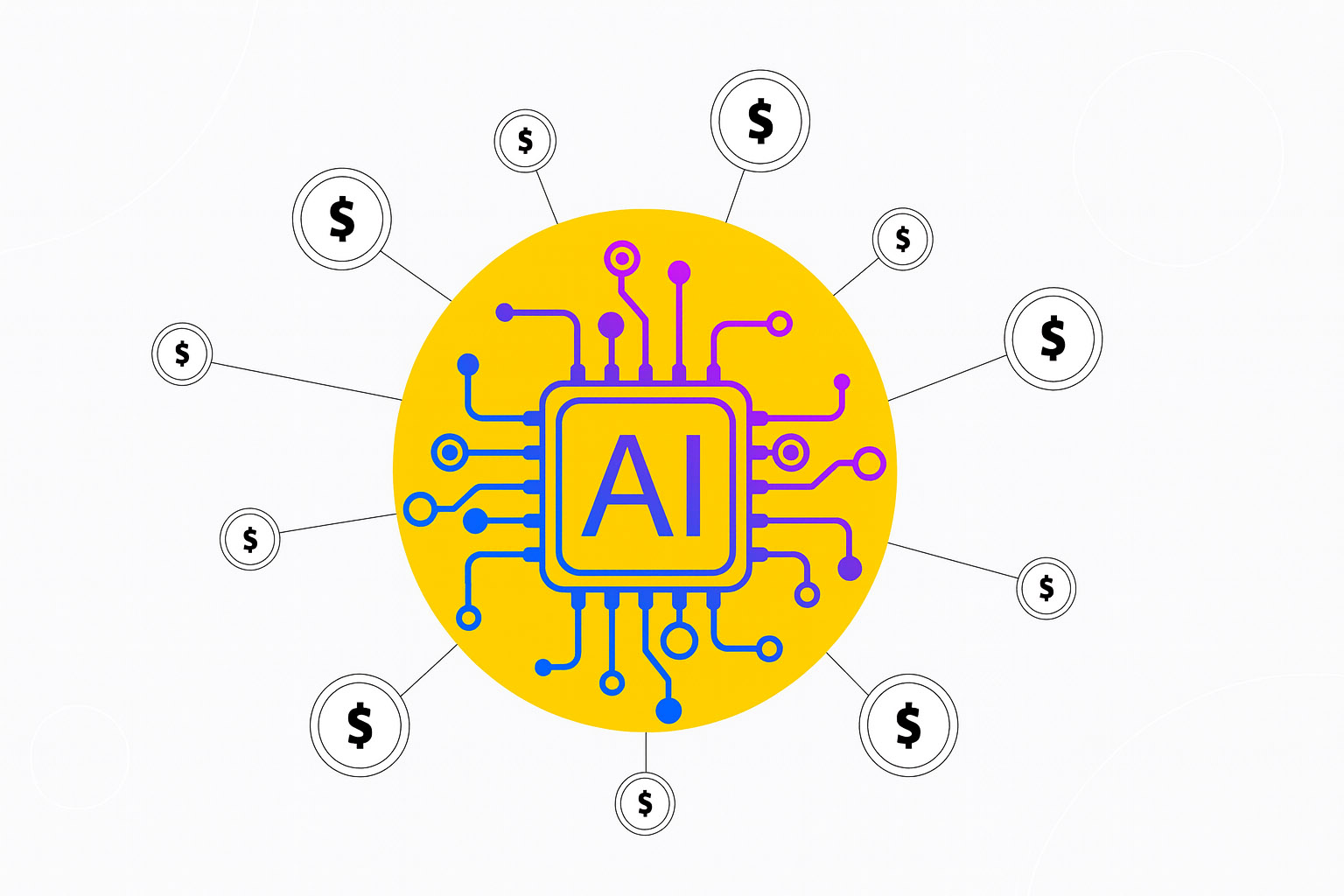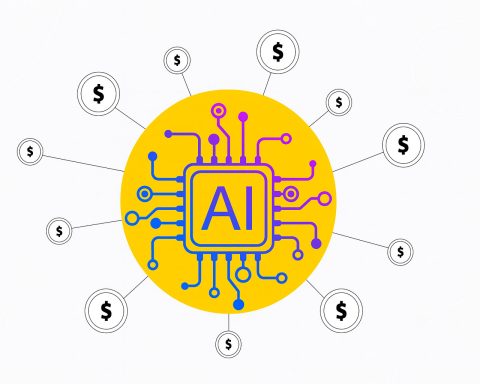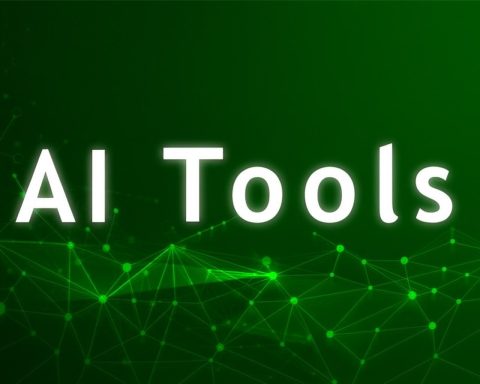- AI Boom = Big Opportunities: Artificial Intelligence is a booming trillion-dollar industry – the global AI market is projected to hit about $1 trillion in the early 2030s shopify.com. In the U.S., AI deals made up 64% of all venture funding in early 2025 reuters.com, signaling huge investor confidence and plentiful opportunities to profit.
- Many Ways to Cash In: You can earn money with AI through various paths – from launching an AI-powered business or app, to selling AI-generated content (articles, art, music), to freelancing with AI tools, to creating AI-focused courses, or even investing in AI stocks/startups. The best part? You don’t always need advanced tech skills or expensive software to start shopify.com.
- High Demand for AI Talent: AI skills are red-hot in today’s job market. Roles like data scientists, machine learning engineers, and AI specialists rank among the fastest-growing jobs in 2025nu.edu. Companies across tech, finance, healthcare, manufacturing, logistics, energy, education, and even government are hiring AI-savvy professionals bluesignal.com – including AI product managers, AI solutions architects, and cybersecurity analysts – often at premium salaries.
- Non-Techies Can Profit Too: You don’t need coding expertise to profit from AI. User-friendly AI platforms (like ChatGPT, Midjourney, or Canva) have intuitive interfaces that let anyone create content or automate tasks “without technical expertise” upwork.com. Entrepreneurs and freelancers are using these tools to start side hustles, streamline businesses, and generate income even with no programming background.
- AI Tools Turbocharge Earning Potential: A range of AI tools and platforms can help monetize your ideas. For example, ChatGPT can draft articles or marketing copy at scale upwork.com, Midjourney and Canva let you create stunning graphics or AI-generated art without design skills upwork.com, and Shopify uses AI for personalized online stores upwork.com. Automation services like Zapier and chatbot builders like ManyChat handle routine work for you upwork.com. Leveraging the right tools can turn a simple idea into a sustainable income stream.
Various Ways to Make Money with AI
AI is not just a buzzword – it’s a toolkit for making money in many different ways. Whether you’re an entrepreneur at heart or looking for a side hustle, 2025 offers more AI-driven income opportunities than ever. Below are some of the most popular ways people are unlocking wealth with AI:
Launching AI-Powered Startups or Side Businesses
One lucrative path is to start your own AI-driven business. This could mean incorporating AI into a new product or service, or using AI to run a business more efficiently. The good news is you don’t need to be a tech wizard to do this. Modern AI services are readily accessible – “you can launch an AI-powered business using accessible tools like Google Gemini or ChatGPT” without massive upfront costs shopify.com. For instance, entrepreneurs are creating AI-enhanced SaaS apps, AI-powered marketplace services, or niche solutions (like AI tools for bookkeeping, marketing, or customer service). AI can handle heavy lifting like data analysis, customer interactions (via chatbots), or even writing code for your app, so you can focus on the business idea itself shopify.com. With the AI startup boom, investors are pouring funds into promising ideas – AI-related startups raised tens of billions and dominated venture funding in 2025 reuters.com. If you can identify a real-world problem and apply AI to solve it faster or cheaper, you have the seed of a profitable startup.
Creating and Selling AI-Generated Content
The rise of generative AI has made content creation one of the easiest ways to make money with AI. You can use AI to generate writing, images, videos, or music and monetize that content in various ways. For example, writers are using AI writing tools (like ChatGPT or Jasper) to draft blog posts, social media content, or e-books, then editing to add a human touch and unique voice. Generative AI makes it easier than ever to create large volumes of content, but success comes from high-quality, original work that “stands out from the flood of generic AI output” upwork.com – so plan to refine the AI’s output with your own expertise upwork.com. You could start a blog or niche website and fill it with AI-assisted articles (monetized by ads or affiliate links), or publish an AI-written newsletter supported by subscriptions.
Visual content is another big market. With tools like Midjourney, DALL·E, or Stable Diffusion, even a non-artist can generate stunning digital images or art pieces. Creators are selling AI-generated illustrations and designs as stock photos, print-on-demand t-shirt graphics, book covers, or art prints. Some have opened Etsy shops for AI-made coloring books, posters, or graphic templates. Formats to explore include written mediums (articles, e-books, social media posts), videos and podcasts (using AI for script writing, voice-overs, or editing), and digital art/merchandise (AI art printed on products) upwork.com. The key is to add human creativity to the mix – for instance, use AI to generate ideas or first drafts, then polish them. Successful AI-content entrepreneurs often build a brand or audience around their content (through YouTube channels, blogs, or social media) and earn through advertising, sponsorships, or direct sales. In short, if you have a creative spark, AI can amplify it and even help you turn creative hobbies into cash.
Freelancing with AI Tools
If you’re a freelancer or want to become one, AI can significantly boost your productivity and the range of services you offer. Freelancing with AI tools means using AI to deliver work faster or offer new types of gigs. For example, if you’re a freelance writer, you can use AI to generate article outlines or first drafts, then refine them – allowing you to take on more clients or higher-paying projects without burning out. If you do graphic design or video editing, AI tools (like Canva’s AI features, Adobe’s AI filters, or Descript for video) can automate tedious parts of the job.
There are also entirely new freelance services emerging around AI. One in-demand role is AI prompt engineering – essentially, being skilled at getting the best results out of AI models and offering that as a service to companies. Freelancers are also selling services like building chatbots for businesses, implementing AI analytics, or consulting on how to integrate AI into operations. On platforms like Upwork and Fiverr, the number of job posts seeking AI-related skills has surged. The great thing is that many AI tools are beginner-friendly. As Upwork notes, “platforms like ChatGPT, Canva, and Midjourney offer intuitive interfaces that let you create and monetize without technical expertise” upwork.com. So even if you’re not a coder, you can start freelancing in areas like content creation, marketing support, basic data analysis, or design by leveraging these AI platforms. By advertising that you use AI, you can also market yourself as a faster or more cost-effective freelancer, which can attract clients. Just remember to maintain quality – use AI to assist, but apply your own skill to deliver results that stand out (this ensures repeat business and referrals).
Developing AI Applications and Selling Them
For those with a bit of coding knowledge or a willingness to learn, developing AI-based applications can be extremely profitable. This might sound technical, but modern AI development can be surprisingly accessible. AI coding assistants (like GitHub Copilot or OpenAI’s code generation) can help write chunks of software for you shopify.com. There are also many pre-built AI models and APIs (from providers like OpenAI, Google, or open-source libraries) that you can plug into your app rather than coding an AI from scratch.
Consider developing an AI-driven mobile or web app that serves a niche: for example, an app that uses machine learning to recommend personalized nutrition plans, or a small business tool that automates invoice processing with AI. You could build a chatbot service specialized for, say, real estate or personal finance questions and sell subscriptions to businesses. Another idea is creating micro-SaaS products – lightweight software tools that use AI for a specific function (like a resume enhancer, an AI interior design planner, etc.). With cloud platforms and open-source models available, a solo developer or a small team can create an AI app in weeks. In fact, Shopify’s research notes that AI can “write the code that powers all kinds of applications, from websites to mobile apps to automation tools,” cutting development time and effort shopify.com. Once you have a working product, you can sell it directly (e.g. offer it as a paid app or SaaS subscription) or license the technology to other companies. Success stories include indie developers who built AI browser extensions or plugins (like those that summarize articles or assist with writing emails) and monetized them via app stores. This path does require more technical involvement than content creation or freelancing, but the payoff can be large if you hit on an in-demand solution – you’re essentially creating a digital asset that can generate recurring revenue.
Building Online Courses and Educational Content Around AI
AI is a hot topic, and teaching others about AI is itself a money-making opportunity. If you have knowledge or even if you learn as you go, you can create online courses, workshops, or coaching services to educate people on using AI tools or understanding AI concepts. There’s a huge audience of business owners, professionals, and students who want to get up to speed with AI but find it intimidating. This knowledge gap makes education and consulting in AI “a lucrative niche”, as one source points out upwork.com.
You don’t need to be a world-renowned expert to start – if you know more than your target audience and can deliver useful guidance, you have value to offer. You could tutor small business owners on how to automate tasks with AI, run webinars on using ChatGPT effectively, or create a step-by-step online course (on platforms like Udemy, Teachable, or Coursera) about an AI topic. For example, you might create a course called “AI for Marketing 101” or “How to Boost Productivity with AI Tools (for Non-Techies)” and charge for enrollment. Another angle is writing and selling e-books or guides on practical AI applications.
The great thing about digital education products is that they scale well. You might start with one-on-one coaching or live workshops to refine your material, then package that knowledge into recorded courses or downloadable resources that sell passively. According to experts, “this is a model that scales” – you can do live sessions then “later package your expertise into evergreen products like self-paced courses or templates,” turning active teaching into passive income streams over time upwork.com. People are willing to pay for shortcuts to understanding AI, especially if you target a specific use-case (say, “AI for Teachers” or “Using AI in Real Estate”). Additionally, offering consulting to businesses on implementing AI solutions can command high hourly rates, and you could transition into that after building credibility through content. If you enjoy teaching or have a knack for explaining tech in simple terms, this route can be both profitable and rewarding.
Investing in AI Stocks and Startups
Not interested in building something yourself? You can still potentially profit by investing in the AI boom. This can take a few forms: buying stocks of companies heavily involved in AI, investing in AI-focused funds, or even directly investing in AI startups (if you have the capital or use equity crowdfunding platforms). The logic here is simple – as AI revolutionizes industries, the companies leading the charge could see significant financial growth, and shareholders share in that wealth.
For instance, major tech companies like NVIDIA (which makes AI chips), cloud providers (Amazon, Microsoft, Google), and AI software firms saw their stock prices surge as demand for AI shot up. In 2023, when generative AI became mainstream, some top AI-related stocks doubled or even tripled in value. The momentum continued into 2024 and 2025, with AI being a key theme on Wall Street. One report noted that 2025’s startup funding boom was “driven largely by major AI investments,” with multi-billion dollar bets on companies like OpenAI and Scale AI reuters.com. This indicates that big players and venture capitalists expect AI to generate huge returns.
For an individual investor, a practical approach might be investing in an AI-focused ETF or mutual fund, which bundles many AI companies together to spread risk. Alternatively, one could pick established companies that are leaders in AI (for example, chipmakers, robotics firms, or software companies with strong AI product lines). Another avenue is to invest in startups via crowdfunding or angel investor platforms – though that requires careful research and is higher risk. If you have knowledge of the field, you might spot a promising startup early. Imagine having invested in an AI startup a few years ago that is now the next OpenAI – the payoff could be substantial. Of course, investing comes with risks, and not every AI stock will be a winner (beware of hype-driven bubbles). But as AI continues to transform the economy, having some stake in that growth – even if you’re not building something yourself – can be a way to make money indirectly from AI’s rise. It’s essentially betting on the picks and shovels of the AI gold rush.
Professions and Industries Where AI Skills Are In Demand Today
While there are many entrepreneurial paths to make money with AI, there’s also a surging demand for professionals with AI skills in the job market. In 2025, companies large and small are racing to integrate AI into their operations, and they need talent who understand these technologies. This means knowing AI can boost your career and earning potential, whether you’re in tech or other fields. Here are some of the top roles and sectors craving AI expertise:
- Data Science and Machine Learning Engineering: These are at the core of the AI revolution. Data scientists and ML engineers build the models and algorithms that turn raw data into insights or automation. They are among the fastest-growing job categories right now nu.edu. In fact, many lists show “AI and data science specialists” as one of the hottest jobs of the year. If you have skills in analyzing data, building predictive models, or training AI systems, you’ll find opportunities in almost every industry – from tech companies to banks to retail. Even entry-level software engineers with AI knowledge are in high demand (job postings for AI-related software roles have been climbing rapidly). These roles often command high salaries and sometimes remote flexibility due to the scarcity of talent.
- AI Product Management: Blending technical understanding with business savvy, AI product managers and project leads are crucial for turning AI ideas into reality. Companies need professionals who can identify how to apply AI to solve business problems, manage AI development projects, and ensure the final product meets user needs. Common roles in demand include “AI Product Managers” and “Directors of Data Science,” according to recruiting specialists bluesignal.com. These roles exist in sectors like software, finance, healthcare tech, etc. If you come from a business or project management background but learn some AI basics, you can become the bridge between the tech team and the business side – a very valuable position.
- Robotics and Automation Engineering: AI isn’t just software – it’s also driving robots and smart machines in industries like manufacturing, logistics, and construction. There’s growing demand for engineers who can design and manage automation systems, robots, and IoT devices that use AI to operate. For example, factories are hiring “AI Engineers for smart automation” in manufacturing plants bluesignal.com. Roles like robotics engineers, control systems engineers with AI knowledge, or automation specialists are needed to implement AI on the factory floor or in warehouses (think automated guided vehicles, robotic arms with vision systems, etc.). This field often requires blending mechanical/electrical engineering with AI software skills. It’s a more niche area, but with Industry 4.0 expanding, these professionals are increasingly sought after – and not just by traditional manufacturers but also by tech companies working on drones, self-driving cars, and delivery robots.
- Healthcare and Medicine: The healthcare industry is undergoing an AI transformation, creating demand for people who can develop and manage AI health applications. This includes roles like clinical data analysts, healthcare AI specialists, and bioinformatics experts. Hospitals and health tech startups are using AI for diagnostic imaging (e.g. AI that reads X-rays or MRIs), personalized medicine (analyzing genetics for tailored treatments), and improving administrative workflows. While healthcare has adopted AI a bit slower than other sectors, the “need for AI solutions is acute” as it can help fill gaps amid worker shortages pwc.com. This means jobs for those who know both healthcare and AI – for instance, a nurse or doctor who learns AI could lead projects to implement decision-support algorithms. Also, medical device companies and pharma companies need machine learning experts for drug discovery and optimizing clinical trials. If you have expertise in life sciences and can grasp AI, you’ll find unique opportunities at that intersection.
- Finance and FinTech: Banks, investment firms, and fintech startups are heavily investing in AI, both to improve services and to stay competitive. AI is used in finance for algorithmic trading, risk assessment, fraud detection, customer service (think AI chatbots answering banking queries), and personalized financial advice. Therefore, roles like quantitative analysts with ML skills, AI developers for fintech apps, or data analysts in banking are booming. The finance sector is one of the “most active hiring AI professionals in 2025” bluesignal.com. Additionally, AI Solutions Architects and ML Engineers in finance are tasked with integrating AI into legacy systems securely. Even customer-facing roles in finance (like personal financial advisors) are expected to evolve rather than disappear – advisors who use AI tools to better serve clients remain valuable (the personal financial advisor field is projected to grow 13% by 2032 despite AI, as human judgment is still key for complex decisions nu.edu). In short, combining financial acumen with AI know-how is a recipe for high demand.
- Marketing and Customer Service: Every company wants to understand and serve their customers better, and AI is the new secret weapon for that. Digital marketing professionals who can leverage AI for ad targeting, customer segmentation, and content optimization are in strong demand. AI can analyze consumer data to find patterns or generate ad creatives, but businesses need marketers who know how to use those AI insights effectively. Job titles like AI Marketing Specialist or Growth Marketer (AI-focused) are cropping up. Similarly, customer service roles are shifting from pure call-center jobs to managing AI-driven support systems. Many companies now use AI chatbots for first-line customer support – they need people to design chatbot conversations (conversational AI designers) and oversee these AI systems. While basic customer service jobs are at risk of automation (AI chatbots have started replacing some call center tasks nu.edu), new roles are emerging to supervise AI and handle complex cases. If you have a background in marketing or customer experience and pick up some AI tool skills, you can position yourself as someone who boosts customer acquisition or retention using AI. Notably, 71% of businesses using AI in marketing and sales report revenue gains – showing how valued these skills are hai.stanford.edu.
- Cybersecurity: With the spread of AI, the threat landscape in cybersecurity is also evolving, which puts experts who understand AI in high demand for defense. Cybersecurity professionals are using AI to detect anomalies or predict attacks, and conversely, they also have to defend against AI-driven cyber threats. This dual need has made AI-savvy cybersecurity analysts very sought after. In fact, information security analyst jobs are projected to grow 32% from 2022 to 2032 – much faster than average nu.edu – partly due to the need to counter new AI-enhanced hacking techniques and manage AI in security operations. Roles include cybersecurity analysts, threat intelligence experts, and security software developers who build AI-based security tools. If you have IT security knowledge, learning AI can significantly boost your career prospects (and paycheck).
In essence, AI skills are becoming fundamental across nearly every industry. The World Economic Forum notes that “AI and big data” top the list of fastest-growing core skills worldwide weforum.org, and employers are willing to pay a premium for those who have them. Even sectors like energy, education, and government are actively hiring AI professionals bluesignal.com. For instance, schools might hire AI curriculum specialists, and governments need AI policy advisors and analysts. Many of these jobs didn’t exist a decade ago, which shows how quickly the landscape is changing.
The takeaway: If you upskill in AI (even at a basic level), you greatly expand your career opportunities. You can work in exciting fields at the cutting edge, often commanding higher salaries than similar roles without AI. And remember, AI expertise isn’t just for PhDs – plenty of roles value a combination of domain knowledge (e.g. finance, healthcare, marketing) plus familiarity with AI tools. So whether you’re a software engineer adding machine learning to your toolkit, or a business analyst learning to use AI dashboards, those skills can make you a linchpin in your organization. This high demand is expected to continue as companies deepen their AI adoption in the coming years.
How Non-Technical People Can Still Profit from AI
One of the most empowering aspects of the AI revolution is that you don’t have to be a programmer or data scientist to make money from AI. In 2025, AI has been democratized in many ways – there are countless AI-driven tools and platforms designed for everyday users. This means “even if you’re not a techie,” you can still harness AI to create value and income. Here are some strategies for non-technical individuals to profit from AI:
- Use AI Tools to Boost Productivity (and Free Up Time for Earning): Even if you’re running a regular business or working a day job, AI can be like an assistant that makes you more efficient and effective. For example, you can use an AI like ChatGPT to help draft emails, write marketing copy, or brainstorm ideas, saving you hours that you can reinvest in more important tasks. Tools like Zapier allow you to automate repetitive tasks between apps (without any coding) – for instance, automatically sorting data, sending routine reports, or updating social media. By automating grunt work, you either reduce business costs (increasing profit) or free yourself to take on more projects. Small business owners are using AI for things like managing schedules, handling basic customer inquiries via AI chatbots, or generating social media posts. If you can do the work of two people thanks to AI, that’s effectively doubling your earning potential. And none of this requires technical expertise, just a willingness to learn how to use the software. In short, treat AI as your productivity partner – the more efficient you are, the more money you can make in whatever you do.
- Curate and Resell AI-Generated Content or Templates: If creating original content from scratch isn’t your thing, you can still profit by curating or repackaging AI creations. A growing trend is selling AI-generated digital goods. For instance, maybe you’re not a graphic designer, but using an AI art generator you can produce attractive designs – you could then sell those as printable art, custom T-shirt designs, or use them to make products (calendars, stickers, etc.). People are also selling AI-generated templates and prompts. Consider that many individuals and businesses want to use AI like ChatGPT but don’t know how to prompt it effectively – some savvy entrepreneurs create prompt “packs” or templates for specific uses (like a set of prompts to generate marketing plans, or prompts to create recipes) and sell them. Similarly, you could generate collections of social media post templates with AI and offer them on a marketplace. Upwork’s guide suggests selling things like “AI-created templates, writing prompts, stock images, or design assets on platforms like Etsy, Gumroad, or Creative Market” upwork.com. This is an ideal approach for non-techies: you leverage AI’s creative output and your own eye for what’s useful or trendy, then list these digital products for sale. It’s essentially an AI-powered e-commerce micro-business, and once you’ve made the product (template, graphic, etc.), it can sell repeatedly (passive income). Even simple things like AI-generated coloring pages or planner inserts have a market online. If you have a knack for knowing what people need (like a template for a resume, a budget spreadsheet, lesson plans, you name it), you can use AI to produce a polished version and monetize it.
- Run an AI-Powered Online Business or Store: Starting an online store or website has never been easier, and AI can make it even more approachable for a non-technical founder. For example, you could launch a dropshipping e-commerce store in a niche you care about and use AI tools to handle many aspects of it. AI can generate product descriptions that are SEO-friendly, come up with engaging product names, or even help with product research by analyzing market trends. Marketing a new business is often the hardest part, but here too AI can help by creating advertising copy, auto-optimizing your ad targeting, and managing your social media presence. According to experts, “AI can give smaller sellers the same optimization power as big brands” in e-commerce upwork.com. That means as a one-person operation, you can use AI to personalize customer recommendations, do dynamic pricing, or automate email marketing – tasks that used to require a whole team. So a non-coder can realistically run a sophisticated AI-enhanced online shop or blog. Platforms like Shopify now have built-in AI features that design your storefront and suggest improvements, which lowers the barrier further. Likewise, if you run a digital marketing side hustle, AI tools let you analyze client data or create content at scale without hiring help. For instance, with minimal tech know-how, you could offer a service to local businesses where you set up a chatbot on their website (using a no-code AI chatbot builder) or run their ad campaigns with AI optimizations. You’re essentially packaging AI’s capabilities into a service for clients, and since the AI does a lot of the heavy lifting, you can manage more clients than you otherwise might, increasing your earnings.
- Leverage “AI-as-a-Service” Platforms: There are platforms specifically meant to help non-tech individuals make money with AI. For example, some websites let you build AI models by uploading data via a simple interface (no coding) and then sell access to that model’s predictions or outputs – effectively creating your own mini AI service. While this is a bit more advanced, it’s still doable without coding if the platform is drag-and-drop. Another angle is participating in AI marketplaces. If you can, say, create good AI-generated music clips or stock photos, there are marketplaces that will connect you with buyers. Even publishing your AI-written short stories on Kindle or training a simple AI chatbot and charging for usage are possible via ready-made platforms. The idea is: take advantage of services that have already built the tech and just need your creativity or domain knowledge. Many startups are offering tools where the back-end AI is handled by them, and you just customize it to a niche. Keep an eye out for these, as they can turn you from a consumer into a creator-entrepreneur overnight.
- Affiliate Marketing and Content Curation with AI: If you’re not creating products or offering services, you can still make money by curating content and driving traffic – and AI can help a ton here. Affiliate marketing involves promoting other companies’ products and earning a commission on sales. AI can expedite this by helping generate blog posts or review videos about products quickly, and by optimizing SEO so that your content gets found. For a non-technical person, using AI SEO tools (like Surfer SEO or Frase) plus AI writing assistants means you can set up a content website that draws visitors and monetizes through affiliate links or ads. You don’t need programming for this, just basic website setup and content strategy. AI will handle a lot of the content creation and even the analysis of which keywords to target. Some people are creating automated niche websites where AI writes regular articles on a topic (e.g., a gardening tips blog with affiliate links to gardening tools), and then they earn through Amazon Affiliates or display ads. While you should always review and edit AI-written content for accuracy and quality, the heavy lifting is reduced, making it feasible for one person to manage a large content site.
In summary, being non-technical is not a barrier to profiting from AI. The emphasis should be on leveraging existing AI tools to do things more efficiently or to do things that were previously out of reach. As long as you can learn how to use a new app or platform (many have tutorials and user-friendly designs), you can integrate AI into your money-making ventures. In fact, the ease-of-use is a selling point: Platforms are so intuitive now that coding knowledge is “not a prerequisite for getting started” in many AI endeavors upwork.com. Focus on what value you can provide or what problem you can solve – then see how AI can help you do it better or faster. This mindset can turn even those who don’t consider themselves “tech people” into successful AI-age entrepreneurs or freelancers.
Monetization Platforms and Tools
To capitalize on AI, it helps to know which tools and platforms can turn your efforts into income. The landscape of AI tools in 2025 is rich and varied, catering to content creators, business owners, and professionals alike. Below is an overview of popular categories of AI-powered tools and platforms that can help you generate revenue:
- AI Content Creation Tools: For writing and copywriting, large language model tools are your best friend. OpenAI’s ChatGPT is a prime example – it can “draft articles, scripts, emails, and product descriptions at scale” upwork.com. You simply input a prompt, and it generates human-like text that you can refine and use. Other similar tools include Claude (from Anthropic) for long-form content or summarizing documents, and Jasper which is tailored for marketing copy and blog posts upwork.com. These tools enable anyone, even non-writers, to produce blogs, social media captions, product listings, and more, which you can monetize through blogs, freelance services, or marketing campaigns. On the visual side, tools like Canva have integrated AI to help create designs quickly – Canva’s AI can suggest layouts, generate images, and even create branding assets upwork.com. Meanwhile, Midjourney and DALL·E 3 are popular platforms for generating high-quality AI art and illustrations from text prompts upwork.com. Creators are using these to produce artwork for clients, websites, or products. If video or audio content is your domain, look at tools like Descript (which uses AI for editing podcasts and videos by editing text transcripts) or Synthesia (for generating AI video presenters). In short, whatever content you want to make – text, images, video, audio – there’s likely an AI tool that can do the heavy lifting, allowing you to create more content in less time and thus make more money from content-driven ventures.
- AI-Powered Freelance Marketplaces: Not a tool per se, but it’s worth noting that platforms like Upwork, Fiverr, and Freelancer.com have sections for AI-related gigs. These marketplaces can be a way to monetize your AI skills or services. You can find clients looking for AI content creation, chatbot setup, data analysis, etc. Upwork in particular has been highlighting freelancers who can use tools like ChatGPT or Midjourney, connecting them with businesses in need. So, while you use AI tools to do the work, these platforms are where you find the paying customers. For instance, you could list a service like “I will create 50 social media posts using AI” or “I will train a custom AI chatbot for your website.” As AI is relatively new to many businesses, those who position themselves on these marketplaces as AI-savvy freelancers can attract a lot of interest.
- Automation and Productivity Platforms: A big category for monetization is automation tools that let you streamline business processes. Zapier is a leading example – it’s a no-code platform that “connects apps to automate repetitive workflows without coding” upwork.com. How does this translate to money? If you run an online business, automation saves you time (which you can use to expand your business or take on more clients). Or if you consult for others, you can set up automations as a service. Another automation tool is IFTTT (If This Then That) for simple connections between apps. ManyChat is a user-friendly platform to build AI-powered chatbots for customer service or marketing on channels like Facebook Messenger upwork.com – small businesses pay for such chatbots to handle common questions or generate leads, and you can either build and sell pre-made bots or charge a setup fee. CRM and customer support software (like HubSpot or Zendesk) are also embedding AI to automate follow-ups and ticket routing. Knowing how to use these can position you to help businesses save money (and they’ll pay you for that knowledge). Even scheduling tools and email management tools now have AI (for example, Calendly’s AI scheduler or Superhuman email’s AI triage). By mastering a few of these productivity platforms, you can dramatically increase how much work you handle, effectively boosting any income that depends on your output.
- Analytics and SEO Tools: If you have a website or do digital marketing, analytics and SEO AI tools can directly impact your revenue by increasing traffic and sales. Tools like Surfer SEO and Frase use AI to help optimize your website content for search engines, suggesting keywords, topics to cover, and even generating content briefs upwork.com. Using these, non-experts can improve their Google rankings, leading to more visitors (and thus more ad clicks or sales). Google Analytics itself now has AI-driven insights – it can automatically find trends in your site’s data and alert you upwork.com (for example, noticing a sudden traffic spike or identifying your best referrers), which helps you make smarter marketing decisions. There are also AI tools for social media analytics that tell you the best times to post or even generate social content (like Predis.ai or Lately). By incorporating these analytics tools, you essentially have a data scientist on call – they help you continuously tweak and improve your content or campaigns for better results, which means more income from those channels. If you run campaigns (Google Ads, Facebook Ads, etc.), AI-based campaign managers can auto-optimize bids and targeting, getting you more bang for your buck.
- E-commerce and Sales Platforms: If selling products is your thing, leveraging AI-driven platforms can directly increase profits. Shopify, for example, has introduced a suite of AI features like an AI website builder and Shopify Magic for copywriting. It “handles everything from store design to product descriptions”, allowing you to launch an attractive, optimized online store quickly shopify.com. Shopify’s AI personalization tools can also tailor product recommendations to each customer, which often boosts sales and average order value upwork.com. If you’re selling handmade or digital goods, Etsy is a marketplace where millions of customers search for unique items – and they welcome AI-created items as long as you’re transparent. You can “sell AI-generated art, templates, or digital downloads to a global audience” via Etsy upwork.com. Other platforms include Amazon (for reaching a broad market, although competition is high) and newer AI-specific marketplaces where you can sell AI models or datasets. There are also AI sales assistants like chatbots for e-commerce sites that increase conversion rates by guiding customers – implementing one could lift your store’s revenue by answering questions 24/7. If you run a sales team or do solopreneur sales, AI tools like HubSpot’s AI or Salesforce Einstein can prioritize your leads and even write draft sales emails. The bottom line is, whatever you’re selling, there’s likely an AI tool to help you sell more effectively and at scale.
- Creative and Design Platforms: We touched on content creation, but it’s worth highlighting creative fields because historically these needed specialized skills. Now, AI allows non-specialists to produce quality creative work that can be monetized. Graphic design: tools like Canva (with AI-powered design suggestions) and Adobe Creative Cloud’s AI features (e.g., Adobe Firefly for generating images, or Photoshop’s AI fill) mean you can design logos, posters, or ads that you can sell as a service or use for your own business branding. Video creation: there are tools like Pictory or InVideo that can generate short promo videos from scripts or blog posts using AI scene selection – perfect for creating marketing videos to sell products or services. Music and audio: AI music generators (e.g., AIVA or Amper) can compose background music or jingles; if you’re into podcasting or YouTube, AI can remove noise and improve audio quality effortlessly. By using these platforms, someone with little to no formal training can enter markets like graphic design, video production, or music licensing. For instance, you could create an AI-generated music track and sell it as stock music, or use AI to design a company’s entire branding package and get paid for it. The key is that the platforms handle the heavy creative process – you just guide them and fine-tune the results to match client needs.
In deploying these tools, choosing the right ones for your goals is important. Not every AI platform will be suitable for everyone. A good approach is outlined by experts: define your main objective (content, products, automation, etc.), assess your comfort level with tech, and then pick a tool that fits and can scale with you upwork.com. Most tools offer free trials or free tiers, so you can experiment without upfront cost upwork.com. As you integrate AI tools into your work, always consider the return on investment – e.g., if a $30/month tool saves you 10 hours of work, it’s probably worth it upwork.com.
Finally, while using these platforms, keep ethics and quality in mind. For sustained success, you should ensure the output meets a standard of quality (don’t just spam AI content) and that you respect any usage rights (some AI tools give you full commercial rights to outputs, others have restrictions – always check licenses if you plan to sell what the AI creates) upwork.com. Being transparent with clients or audiences when appropriate (like labeling AI-generated content) can also build trust. When used wisely, these AI tools and platforms can dramatically lower the barrier to entry in many ventures and significantly increase your earning capacity. The combination of human creativity plus AI efficiency is a powerful formula – it lets you try new business ideas quickly, iterate fast, and either find the ones that make money or create multiple income streams at once.
In conclusion, making money with AI in 2025 is about marrying innovation with practicality. You don’t need to be a tech guru or have a huge budget. As we’ve seen, there are accessible AI tools and in-demand opportunities for just about every background: entrepreneurs can launch AI-enhanced startups, creatives can sell AI-generated works, freelancers can turbocharge their services with AI, and professionals can ride the wave of high-paying AI-driven roles. The industries embracing AI range from finance to healthcare to marketing, meaning AI skills can elevate almost any career or business nu.edubluesignal.com. And even if you’re not technical, you can still profit by using AI as your assistant or by reselling its outputs in clever ways upwork.com. The key is to start: experiment with the tools, identify where AI can solve a problem or add value, and then take action. AI is often called the new electricity – a general-purpose technology that can power countless applications. Those who learn to harness this “power” in 2025 stand to unlock new wealth and opportunities, often in places we never imagined before. The playing field is more level than ever, so dive in and let AI amplify your entrepreneurial and career ambitions. The potential is vast – and it’s waiting for techies and non-techies alike to seize it. shopify.com, upwork.com
















